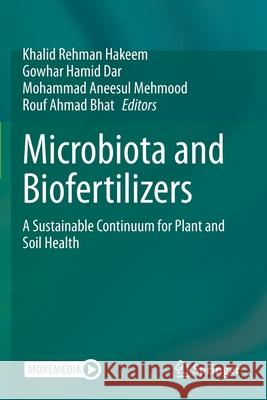Microbiota and Biofertilizers: A Sustainable Continuum for Plant and Soil Health » książka



Microbiota and Biofertilizers: A Sustainable Continuum for Plant and Soil Health
ISBN-13: 9783030487737 / Angielski / Miękka / 2021 / 320 str.
Microbiota and Biofertilizers: A Sustainable Continuum for Plant and Soil Health
ISBN-13: 9783030487737 / Angielski / Miękka / 2021 / 320 str.
(netto: 651,74 VAT: 5%)
Najniższa cena z 30 dni: 655,41
ok. 22 dni roboczych.
Darmowa dostawa!
1. Introduction to Microbiota
Dr. Maryam Sarwat; Department of Biotechnology, Amenity University, Noida, UP, India; maryam21_7@yahoo.com
2. Chemical fertilisers and their impact on soil health
Luigi Cattivelli; CRA – Genomic Research Centre, Via S. Protaso 302, 29017 Fiorenzuolad’Arda (PC), Italy; l.cattivelli@iol.it; luigi.cattivelli@entecra.it
3. Biofertilisers: a viable toolfor future organic agriculture
Adeel Malik; Chungnam National University, Daejeon, South Korea; adeelmalik010@gmail.com
4. Global biofertilser industry: progress and challenges
Jian-Kang Zhu; Shanghai Center for Plant Stress Biology and Center for Excellence in Molecular Plant Sciences, Chinese Academy of Sciences, Shanghai 201602, China ; jkzhu@purdue.edu
5. Potential role of biofertilisers in agriculture with emphasis on nitrogen fixers and phosphate solubilizes
Grant R Cramer; Department of Biochemistry and Molecular Biology, Mail Stop 330, University of Nevada, Reno, Nevada 89557, USA; cramer@unr.edu
6. An overview of biofertiliser sector in the world
M Qadir; International Center for Agricultural Research in the Dry Areas (ICARDA), P.O. Box 5466, Aleppo, Syrian Arab Republic; m.qadir@cgiar.org
7. Microbial inoculants as biofertiliser
Fernanda Maria Policarpo Tonelli Department of Cellular Biology, Institute of Biological Science, Federal University of Minas Gerais, Belo Horizonte, Brazil email: tonellibioquimica@gmail.com
8. Fungi and their potential as Biofertilizers
Monica Butnariu Banat’s University of Agricultural Sciences and Veterinary Medicine “King Michael I of Romania” from Timisoara, 300645, Calea Aradului 119, Timis, Romania (email: monicabutnariu@yahoo.com)
9. Application of Mycorrhiza in crop management
Sartaj Hussain Bhat; Gifu University, 1-1 Yanagido, Gifu City-501-1193, Japan
10. Plant-Growth-Promoting Rhizobacteria as Biofertilizers and Biopesticides
N. Malash;Faculty of Agriculture, Menofiya University, Shibin El-Kom, Egypt; n_malash@hotmail.com
11. Rhizobia Symbiosis for Sustainable Agriculture
Umar Nazir; Department of Ecology and Environmental Sciences, Pondicherry University, Puducherry, India-605014; unbspn@gmail.com.
12. Synergetic role of Arbuscular Mycorrhizae Fungi (AMF) and plant growth promoting rhizobacteria (PGPR) in Organic Farming
Niste Monica; University of Agricultural Sciences and Veterinary Medicine Cluj-Napoca, Manastur St., no. 3-5, 400372 Cluj – Napoca, Romania; roxana.vidican@usamvcluj.ro
13. Cyanobacteria as sustainable microbime for agricultural industries
WantiMindari;Faculty of Agriculture University of Brawijaya, Malang Indonesia; and Faculty of Agriculture, University of Pembangunan National, Surabaya, Indonesia;wanti_mindari@yahoo.com
14. Application and viability of Macrophytes as green manure
Scott AL Hayward; University of Birmingham, College of Life and Environmental Sciences, School of Biological Sciences, Edgbaston, Birmingham B15 2TT, UK; s.a.hayward@bham.ac.uk
15. The microbiome: potential significance of beneficial microbes in sustainable agriculture
BasiaVinocur; The Robert H Smith Institute of Plant Sciences and Genetics in Agriculture and the Otto Warburg Center for Agricultural Biotechnology, The Hebrew University of Jerusalem, PO Box 12, Rehovot 76100, Israel; altman@agri.huji.ac.il
16. Role of recombinant DNA technology in biofertiliser production
Sha Liu; Department of Plant Soil and Microbial Sciences, Michigan State University, East Lansing, MI 48824, United States; Merewitz@msu.edu
17. Application of micro -biome in Organic Farming
N. Sreenivasulu; Leibniz-Institute of Plant Genetics and Crop Plant Research (IPK), Corrensstrasse 3, 06466, Gatersleben, Germany; srinivas@ipk-gatersleben.de
18. Role of Micro Algae as biofertilizer industry for sustainable plant and soil health
Luis Santos Pereira;Department of Agricultural Engineering, Institute of Agronomy, Technical University of Lisbon, Tapada da Ajuda 1349-017, Lisboa, Portugal; lspereira@isa.utl.pt
19. Organic farming a viable tool for soil and plant health.
Omar bin Hameed; Department of Food Science and Process Engineering Abaya Campus Arba Minch University, Ethiopia; omargojwari@gmail.com
20. Actinimycetes: as bio-fertilizer for sustainable approach
John P. Moore; Institute for Wine Biotechnology, Faculty of AgriSciences, Stellenbosch University, Private Bag X1, Matieland 7602, South Africa; moorejp@sun.ac.za
21. Azospirillum as biofertilizer
B.A.M Bouman; Soil and Water Science division, International Rice Research Institute, P.O. Box 3127, Makati Central Post Office,1271 Makati City, Philippines; b.bouman@cgair.org
22. Application Macrophytes as biofertilizer.
Dipanjana Ghosh; Department of Biological Sciences, NUS Centre for BioImaging Sciences, National University of Singapore, Singapore; dbsxj@nus.edu.sg; dbsdg@nus.edu.sg
An increasing population has put tremendous pressure on agricultural productivity to fulfill the demands of human consumption. Numerous agricultural activities and techniques have been developed to raise annual crop production globally. While agriculture has succeeded in enhancing the yearly crop productivity, this achievement is at the cost of environmental degradation by applying synthetic persistent substances, such as industrial fertilizers, pesticides, herbicides, etc. Chemical fertilizers are nearly as destructive as they are productive, causing monocultures and consequences associated with elimination of diversity, nutrient pollution as evidenced by algae blooms, eutrophication, water quality issues, lower oxygen levels and dangers to fish stocks. Therefore, the scientific approach to maintain sustainable fertility in soil and plants is to switch over to biofertilisers.
Biofertilisers are compounds of organic matter that are applied to crops for growth and health. Their constituent micro-organisms interact in an ecofriendly manner with the soil, root and seeds of plants, promoting the growth of micro-flora that enhances soil fertility. They are known to play a number of vital roles in soil fertility, crop productivity and production in agriculture. Application of biofertilisers results in increased mineral and water uptake, root development, vegetative growth and nitrogen fixation. They liberate growth promoting substances and vitamins and help to maintain soil fertility. They act as antagonists and play a pivotal role in neutralising the soil borne plant pathogens, thereby assisting in the bio-control of diseases. Application of biofertilisers in lieu of synthetic fertilizers could be the promising technique to raise agricultural productivity without degrading the environmental quality.
The present book focuses on the latest research approaches and updates from the microbiota ecosystem and their applications in agriculture industry. It also highlights the great potential and possible future of action of microbiota in the development of sustainable agricultural systems.1997-2026 DolnySlask.com Agencja Internetowa
KrainaKsiazek.PL - Księgarnia Internetowa









